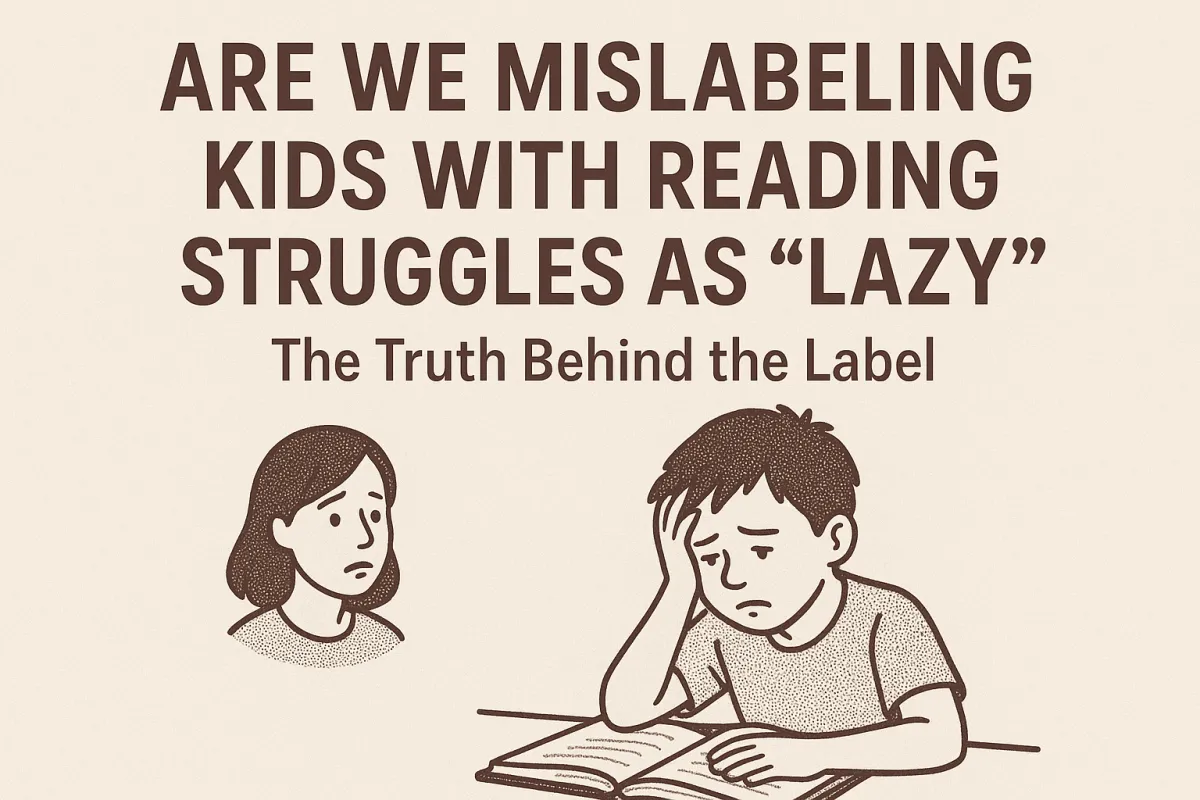
Breaking the 'Lazy' Label – Helping Kids with Reading Struggles Through Music-Based Learning
Are We Mislabeling Kids with Reading Struggles as “Lazy”? The Truth Behind the Label
Introduction
It’s a familiar scene: a child sits at a desk, head down, eyes wandering across a page. They’ve been on the same sentence for minutes. A frustrated adult says, “You just need to try harder.” For many children, especially those with reading difficulties, this is the moment they’re branded with the word “lazy.”
But here’s the truth: most kids who struggle to read are working harder than their peers—often far harder than adults realize. Mislabeling them as lazy doesn’t just miss the mark; it can derail confidence, motivation, and academic growth.
In my work helping families and educators address literacy challenges, I’ve seen firsthand how shifting our language and approach can turn frustration into progress.
Understanding Reading Struggles
Reading difficulties are not a reflection of character or willpower. They often stem from:
Dyslexia – A neurological difference that affects how the brain processes written language.
Decoding challenges – Trouble matching letters to sounds.
Comprehension gaps – Understanding words but struggling to extract meaning from text.
These are cognitive processing differences, not a lack of motivation. Brain imaging studies show that children with dyslexia activate different neural pathways when reading—requiring more effort for the same task.
The Cognitive Load Kids Carry
For a struggling reader, every word is a puzzle. While fluent readers instantly recognize words, struggling readers may need to:
✔️ Identify each letter
✔️ Recall its corresponding sound
✔️ Blend sounds into a word
✔️ Assign meaning to that word
✔️ Fit it into the larger sentence context
That’s a lot of mental juggling. It’s no surprise that this effort leads to mental fatigue, distraction, or shutting down—all of which can look like laziness but are actually signs of cognitive overload.
The Emotional Toll of Mislabeling
When a child repeatedly hears “lazy” or “not trying,” the damage runs deep:
Low self-esteem – They begin to believe they’re “bad” at school.
Anxiety – Fear of being called out in front of peers.
Disengagement – Avoiding reading to escape judgment.
This creates what researchers call the Matthew Effect—where early difficulties cause falling further behind, making catch-up increasingly hard.
Why “Lazy” Is an Easy but Dangerous Label
It’s human nature to assume that effort = outcome. If a child isn’t progressing, it’s tempting to think they’re not trying. But this mindset overlooks:
Many kids are trying, just without the right strategies or tools.
Myths about dyslexia—like “seeing letters backwards”—oversimplify the reality.
Educators often lack training in identifying subtle reading disorders.
The “lazy” label is dangerous because it stops the search for the real cause.
The Better Way: Support Over Stigma
Instead of labeling, we can:
Reframe – Replace “lazy” with “learning differently.”
Intervene early – Use multisensory methods (visual, auditory, kinesthetic) proven to help reading.
Provide targeted tools – This is where my business comes in—offering [specialized literacy assessments and individualized learning plans] tailored to uncover root causes, not just surface symptoms.
By addressing the problem at its source, we make reading less exhausting and far more rewarding.
How Music Can Amplify Reading Success
While the Orton-Gillingham approach is a gold standard for structured literacy instruction, pairing it with music-based learning can further accelerate progress for struggling readers.
Music stimulates multiple areas of the brain—many of the same neural networks involved in reading. Rhythm, melody, and repetition can:
Strengthen phonological awareness – Singing and clapping to syllables help children hear and segment sounds.
Improve working memory – Musical patterns and lyrics train the brain to hold and process sequences, much like decoding a sentence.
Enhance focus and engagement – Music can reduce stress and make practice sessions feel less like “work” and more like play.
For example, pairing OG phonics drills with rhythmic chanting or simple songs reinforces sound-letter connections in a multisensory way. Studies have shown that when music is integrated into reading programs, children often retain skills longer and show more enthusiasm for practice.
By weaving music into structured literacy interventions, we give children not just another way to learn—but another way to enjoy learning.
Practical Strategies for Parents and Educators
Watch for red flags – Struggling with rhyming, avoiding reading aloud, or guessing words without sounding them out.
Use evidence-based programs – Orton-Gillingham, multisensory learning, and music-assisted literacy approaches.
Celebrate effort, not just results – Reinforce persistence and growth.
Parents and teachers working together—with the right guidance—can transform a child’s learning trajectory.
If your child, student, or client is struggling with reading, don’t settle for the “lazy” label. Get curious. Get them assessed. And most importantly—give them the support they need to thrive.
I help families and schools bridge the gap between frustration and literacy success. Let’s replace stigma with strategies, and watch reading confidence grow.
Conclusion:
Mislabeling a child as lazy doesn’t just hurt—it hides the real issue. With awareness, empathy, and the right interventions, we can rewrite the story for struggling readers.
Because every child deserves to be seen for their effort, not just their outcome.
Key Takeaways
Lazy ≠ Learning Difficulty – Most reading struggles have neurological or developmental causes, not motivational ones.
Cognitive Overload is Real – Struggling readers expend more mental energy, which can mimic disengagement.
Labels Have Consequences – The wrong words can harm self-esteem and academic progress.
Intervention Beats Assumption – Orton-Gillingham, multisensory learning, and music-based strategies offer proven results.
Early Action Matters – The sooner challenges are identified, the better the long-term outcomes.
